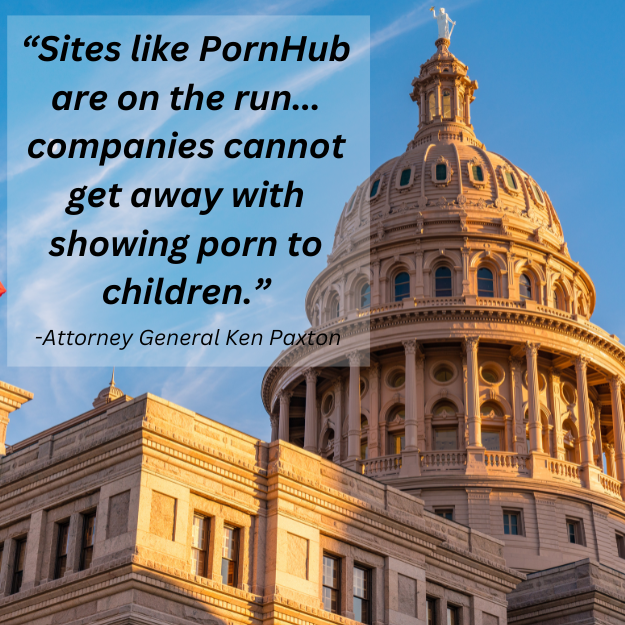3 Minute Read
It’s been amazing to witness that over the last couple years, states have been taking aggressive action in an attempt to combat children’s access to online pornography. To date, seventeen states have passed various age-verification laws to do this, with some laws being more aggressive than others, and others currently awaiting the governor’s signature. However, none have seen such success than in Texas, and it’s all because of the chosen method of enforcement.
This wave of state action began in 2022 when a freshman legislator from Louisiana, Rep. Laurie Shlegel, after hearing of the childhood struggles of famed singer Billie Eilish with pornography championed (with the help of renowned author/speaker Dr. Gail Daines) the nations first state-based age verification bill. The bill had overwhelming support from both Democrats and Republicans, passing nearly unanimously in both the House and Senate. Once passed, the law was immediately met with a lawsuit from Free Speech Coalition- a lobbyist for the pornography industry, but was soon dismissed leaving the open door for states to champion similar bills of their own.
After Louisiana’s bill went into effect, a spokesperson from Pornhub shared with CNN that traffic to their site decreased by 80% as a result of the bill, and later Pornhub responded by simply denying access to states with these new laws. However, Louisiana found that only the larger websites complied with the law, which did not fully satisfy the intent of the legislation, so next session they passed the PAVE Act that empowered the attorney general to investigate sites for non-compliance and impose hefty fines.
Texas, in 2023, took both Louisiana bills, added their flavor to it, and passed an age-verification law of their own. Their law was also challenged, but was cleared (with the exception of forced-speech on porn sites landing pages) by 7th Circuit Appellate Court now allowing states to take even greater action by auditing sites for non-compliance and taking direct action through the Attorney General’s office. Judge Jerry Smith, writing for the majority of the Court, notably said that online age verification was equivalent to requiring in-person age verification to buy pornographic magazines, which has been upheld by the U.S. Supreme Court in Ginsberg v. New York (1968). Treating it differently “implies that the invention of the Internet somehow reduced the scope of the state’s ability to protect children,”
Texas then did something that neither Louisiana or any other state with similar language had done– they began to take aggressive action. In February 2024, three months after Court victory, Attorney General Ken Paxton filed lawsuit against Aylo Global Entertainment (who runs several of the largest pornographic websites including Pornhub) for 1.6 million dollars, and $10k per day for violating HB1181. Rather than complying with the law, Pornhub opted to shut down its site entirely in Texas. To this, Attorney General Paxton said,
“PornHub has now disabled its website in Texas. Sites like PornHub are on the run because Texas has a law that aims to prevent them from showing harmful, obscene material to children. In Texas, companies cannot get away with showing porn to children. If they don’t want to comply, they should leave Texas.”
The next month, Paxton sued two more adult sites- Multi Media, LLC, and Hammy Media, major pornography companies that operate sites such as “Chaturbate” and “xHamster,” for non-compliance and for only providing visitors with a pop-up button to click if they are 18 or older. According to Kxan, The state is asking the court for xHamster to pay a civil penalty of up to $1.67 million as well as an additional $10,000 a day since the lawsuit’s filing. Texas is seeking a higher civil penalty from the company that owns Chaturbate — $1.78 million along with the $10,000 a day for every day after the filing of the lawsuit. Texas successfully collected $675,000 in fines from Chaturbate for failing to age-verify minors, and successfully brought them into compliance through their strong effort and rigid enforcement.
The line of legality has always been drawn by prosecutors, not by legislation alone, and pornographers will comply with laws in proportion to how aggressive states enforce them. Currently, there’s a federal version of this bill called the SCREEN act (sponsored by Rep. Miller and Senator Lee) that requires robust age-verification and enables the Federal Trade Commission to audit for non-compliance and take enforcement. The National Decency Coalition has had the pleasure of assisting both sponsors with the progression of the bill, and we can tell you from experience, though there’s slow progression of the bill, there’s hardly any urgency on the Hill.
Sadly, there’s no major point of inflection that has made this a central issue of representatives on the Hill. Imagine if parents in the 90s woke up one day to find every child with pornography in their hands. There would be a bill on the floor of Congress tomorrow, and with unified support. The frog in the pot is boiling, and everyone is just used to the way of life.
It’s certainly encouraging to see states taking real action in recent years. From the resolutions declaring the crisis of pornography starting in 2016, to age-verification laws taking off in 2022. My guess is that states will be the ones that finally put this monster to death in our country. There has been no greater example of urgency and aggression toward this problem than from Texas, and it’s our hope that other states will mimic their enforcement, and slowly but surely force compliance for the entire nation.

